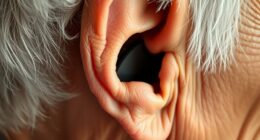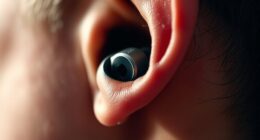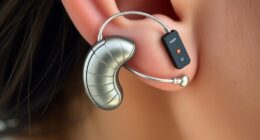Coffee breath has a strong, distinctive odor that often isn't pleasant. You might notice a sulfurous scent, similar to rotten eggs, mixed with sharp, acrid notes. There are earthy undertones, along with bitter and musty hints due to the tannins in coffee. This breath can linger long after you've had your drink. Factors like dry mouth from caffeine and the acidity of coffee contribute to this issue, allowing odor-causing bacteria to thrive. If you're curious about how to manage this aroma and the impact on your social interactions, you'll find more tips ahead.
Key Takeaways
- Coffee breath often has a distinctive sulfurous odor, resembling rotten eggs due to sulfur-containing compounds in coffee.
- It features sharp, acrid notes that can be noticeable to those nearby, creating a strong scent profile.
- The aroma may include earthy undertones combined with bitter and musty notes, resulting in a complex smell.
- Lingering odors persist long after coffee consumption, especially due to tannins, which bind to saliva proteins.
- The scent can vary based on coffee type, with dark roasts typically having a more intense and pronounced aroma.
Introduction

Coffee breath is something many people experience, and it can be quite off-putting. The distinct odor often resembles sulfur, which might remind you of rotten eggs. This unpleasant scent arises from sulfur-containing compounds released during the coffee roasting process. When you enjoy your favorite brew, the acidity can disrupt your mouth's pH balance, promoting the growth of bacteria that lead to bad breath.
Additionally, caffeine can cause dry mouth, a condition that reduces saliva production. Saliva is crucial for washing away odor-causing bacteria, so when it's in short supply, you're more likely to face bad breath. The tannins found in coffee can also bind to saliva proteins, further diminishing its availability and allowing bacteria to thrive.
If you're not vigilant about your oral hygiene after indulging in coffee, you might find yourself dealing with halitosis as a result. The combination of sour, bitter, and sulfurous notes can create a potent mix that lingers long after your last sip. Being aware of these factors can help you take steps to minimize the impact of coffee breath.
Description of the Smell

The smell of coffee breath can be quite distinctive and off-putting. It often presents a sulfurous odor, reminiscent of rotten eggs, thanks to the sulfur-containing compounds produced during roasting. This unpleasant scent isn't just from the coffee itself; its acidic nature can lead to bacteria growth in your mouth, worsening bad breath. You may notice a sharp, acrid note that catches the attention of those nearby.
Caffeine's drying effect further contributes to a stale smell, as reduced saliva levels allow odor-causing bacteria to thrive. When you drink coffee, tannins in the brew bind to proteins in your saliva and oral tissues, resulting in a lingering odor that persists long after your last sip. The complex scent profile of coffee breath often includes earthy undertones, accompanied by bitter and musty notes that can be hard to ignore.
In essence, coffee breath can leave you with an aftertaste that is not only stale but also carries a unique blend of acrid notes and an earthy scent, making it a memorable experience for anyone within smelling distance.
Source and Composition

Breath infused with the scent of coffee originates from a combination of volatile compounds released during the roasting process and the chemical interactions within your mouth. When coffee beans are roasted, they produce sulfur-containing aroma compounds that contribute to that strong, pungent odor. The acidity of coffee can create an imbalance in your mouth's pH, encouraging the growth of odor-causing bacteria. These bacteria release volatile sulfur compounds, which can intensify bad breath.
Moreover, caffeine's dehydrating effects lead to dry mouth, inhibiting saliva production. When saliva is low, it can't effectively wash away odor-causing particles and bacteria. Tannins found in coffee further complicate the situation by binding to saliva proteins, reducing its ability to cleanse your mouth. This combination of factors makes it easy for the bacteria in your mouth to thrive, resulting in breath that can smell like rotten eggs or sulfur, especially if you frequently consume coffee with sugar and milk. Your oral hygiene habits also play a role; neglecting them can exacerbate the problem, leaving you with a lingering coffee breath that's hard to ignore.
Typical Scenarios or Environments

In settings where coffee is a staple, like bustling offices or cozy cafes, the aroma of coffee breath becomes a shared experience among patrons. You might notice that coffee breath often carries a strong, bitter scent, largely due to sulfur-containing compounds released during the roasting process. The high acidity of coffee promotes bacterial growth, which produces volatile sulfur compounds that can create an odor reminiscent of rotten eggs.
As you sip your morning brew, the drying effect of caffeine can lead to a stale smell, especially if you or those around you don't prioritize oral hygiene. This is particularly noticeable in environments filled with coffee drinkers, where the collective coffee breath creates a unique olfactory backdrop.
Interestingly, if you add milk or sugar to your cup, the smell can shift, often resulting in a sweet or creamy scent that still carries that underlying bitterness. In these typical scenarios, the interplay of coffee breath with other aromas enriches the experience, making it a defining characteristic of coffee culture in any communal space.
Emotional or Cultural Associations

Coffee's aroma often evokes a sense of warmth and comfort, stirring emotions tied to shared moments over a cup. The scent of coffee breath can remind you of cozy gatherings, symbolizing hospitality and community. When you sip coffee with friends or colleagues, those social interactions create bonds that linger long after the last drop is gone.
In many cultures, coffee breath signifies indulgence and sophistication, especially in settings where coffee is treated as a gourmet beverage. You may find that the rich, earthy aroma enhances your experience, making you feel a bit more refined. Yet, it's essential to recognize that coffee breath can elicit negative emotional responses in certain situations. In close social or professional encounters, it might be perceived as unappealing, potentially impacting your interactions.
Moreover, the presence of coffee breath often reflects a busy lifestyle, hinting at your reliance on caffeine for productivity. In a fast-paced world, it's a badge of honor for some, a necessary fuel for tackling daily challenges. So next time you catch a whiff of coffee breath, consider its rich tapestry of emotional and cultural associations.
Health or Safety Considerations

Many people don't realize that the distinct smell of coffee breath can be linked to various health and safety considerations. The acidity of coffee can disrupt the pH balance in your mouth, promoting the growth of bacteria that release volatile sulfur compounds, which contribute to that unpleasant odor. You might also notice that caffeine causes dry mouth, reducing saliva production and allowing bacteria to thrive. This creates an environment where bad breath can flourish.
Tannins in coffee can further inhibit saliva production by binding to saliva proteins, worsening the situation. If you add sugar or milk to your coffee, you're providing additional food for bacteria, which can lead to the release of even more sulfur gas, intensifying the smell.
It's essential to keep these factors in mind, as chronic bad breath may indicate an underlying dental issue or the need for better oral hygiene practices. Regularly brushing your teeth, staying hydrated, and perhaps moderating your coffee intake can help mitigate these concerns and keep your breath fresher. Remember, taking care of your oral health can significantly impact how your breath smells after enjoying your favorite cup of coffee.
Final Thoughts

Understanding the complexities of coffee breath is crucial for anyone who enjoys their daily cup. You might not realize that the foul odor associated with coffee breath primarily stems from sulfur-containing compounds generated during the roasting process. The high acidity of coffee can disrupt the pH balance in your mouth, creating an environment that promotes bacterial overgrowth, which leads to bad breath.
Caffeine and tannins can also contribute to dry mouth by reducing saliva production. Saliva is essential for washing away bacteria and neutralizing acids, so a lack of it can exacerbate the unpleasant smell. Adding milk or sugar to your coffee might seem harmless, but these additives can further intensify the odor by promoting the growth of odor-causing bacteria, resulting in volatile sulfur compounds that linger in your mouth.
To combat coffee breath, maintain a strong oral hygiene routine. Brushing your teeth regularly, using mouthwash, and staying hydrated can significantly reduce the impact of coffee's acidity and the associated bad breath. By being aware of these factors, you can fully enjoy your coffee without the worry of lingering odors.
Frequently Asked Questions
Does Coffee Breath Smell Bad?
Yes, coffee breath can smell bad. When you drink coffee, it leaves behind sulfur compounds that often result in an unpleasant odor. If you sip on it regularly, you might notice a sour, bitter scent lingering on your breath. The acidity can promote bacteria growth in your mouth, making things worse. Plus, if you add milk or sugar, it can lead to even more odor-causing bacteria. So, freshening up after that cup is a good idea!
How Do You Tell Someone They Have Coffee Breath?
When you notice someone has coffee breath, it's best to approach the topic gently. You might say something like, "Hey, I love coffee too, but I've noticed it can leave a strong smell sometimes. Have you tried brushing your teeth or using a mint afterward?" This way, you're sharing your experience while also offering a solution, making it less awkward. Remember, everyone's been there—you're just looking out for them!
How to Tell if Bad Breath Is Coming From the Stomach?
If you suspect bad breath is coming from your stomach, pay attention to the odor. It might smell sour or resemble spoiled food. You could also notice other symptoms, like heartburn or indigestion. Keep an eye out for a bitter taste in your mouth, too. If your breath has a fruity or sweet scent, that could indicate a more serious issue. It's best to consult a doctor for proper evaluation if these signs persist.
What Does GERD Breath Smell Like?
If you're dealing with GERD, your breath might have a sour or acidic odor. This unpleasant smell often stems from stomach acids backing up into your esophagus and mouth. You could also notice a metallic or bitter taste, which can worsen after eating trigger foods like spicy or fatty meals. Additionally, halitosis may escalate due to bacteria in your mouth producing foul-smelling compounds. Overall, it's an experience no one wants to face.









